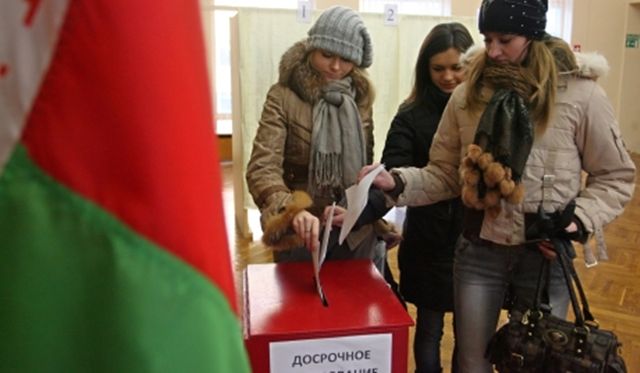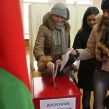
Lukashenka Compromises to Gain Moscow’s Support
Publication: Eurasia Daily Monitor Volume: 7 Issue: 225
By:

On December 19, ten candidates will contest the Belarusian presidency. The election has been notably open, with several opposition candidates reaching out for support from Moscow, and the European Union offering encouragement to the incumbent president conditional on some basic requirements for a democratic process. However, belatedly the president has reached a pre-election agreement with Moscow on oil and gas imports to gain qualified support, at a high price.
Opinion polls suggest that although Alyaksandr Lukashenka leads his rivals, he lacks a clear majority. Lukashenka’s electoral rating two weeks before the election was between 31 and 48 percent. Indeed, Lukashenka’s closest rivals trailed: Uladzimir Nyaklayeu, leader of the “Speak the Truth” campaign on 15.1 percent to 16.8 percent, Andrei Sannikau, 8.6 percent to 10.6 percent, and Yaraslav Ramanchuk a respectable fourth (6.1 percent to 8.2 percent), with the remainder of the field well behind. According to the poll conducted by the Ukrainian agency SOCIUM, approximately one-third of voters were still undecided (https://nekliaev.org/en/news/actual/socopros-v-belorussii-lukashenko-vinoven-453-ego-prezidentskiie-reieting-314.html, www.belmy.by, December 8).
The recent rift between Belarus and Russia appeared to make Lukashenka more vulnerable. Moscow made it clear that it would not necessarily guarantee another “elegant” Lukashenka victory and last September on his video-blog, President Dmitry Medvedev commented that the Belarusian leader had broken all the rules of decency (www.rt.com, October 4). The language was ominously similar to the letter with which he severed relations last fall with former Ukrainian President, Viktor Yushchenko (Interfax, August 11).
The Belarusian authorities had to act promptly to censor several Russian television programs that attacked and ridiculed their president. However, Lukashenka received unexpected backing from the Lithuanian President, Dalia Grybauskaite (www.charter97.org, November 23), and after a November visit to Minsk, Guido Westerwelle and Radoslaw Sikorski, the Foreign Ministers of Germany and Poland respectively, informed Lukashenka that if the election was conducted fairly, they would use their influence to solicit a $3.8 billion EU loan for Belarus, with the assistance of the International Monetary Fund (IMF) (www.thenews.pl, November 22).
Thus, the election campaign for several weeks turned Belarusian politics on its head. The EU appeared to be behind Lukashenka, while the opposition candidates, particularly Sannikau and Neklyayeu appealed to Russia. However, Moscow declined to endorse any of the nine candidates, despite support for them at lower levels of the Russian hierarchy. It left the door open for negotiations in the knowledge that Lukashenka would be in Moscow in early December for talks on the introduction of a common economic space (along with Kazakhstan), as well as meetings of the Eurasian Economic Community, the Collective Security Treaty Organization (CSTO) and the CIS (Belorusskiy Partizan, December 10).
While paying some lip service to a democratic election, the president distanced himself from “the circus.” Lukashenka informed a German audience that he expected a “landslide” victory and that the entire opposition between them could only amass about 1.5 percent (RTT News, November 15). The dismissive tone echoed his mid-September comment (a familiar one) that the Belarusian oppositionists were “enemies of the people” (RIA Novosti, September 16). Meanwhile, Lukashenka increased the average wage to $500 per month and promised it would increase to $1,000 by 2015 (SB Belarus’ Segodnya, December 7).
During the December “debate” on Belarusian Television, Lukashenka declined to appear. The program announced that the nine candidates offered identical programs –a comment repeated by Lukashenka a few days later (SB-Belarus’ Segodnya, December 8). Nyaklayeu walked out in disgust (Nasha Niva, December 4). Yet, the opposition candidates did not help their own cause. Sannikau and Statkevich appealed to viewers to gather on the “square” (Kastrichnitskaya Square in the center of Minsk) at 8.00 pm on December 19, without giving specific reasons for doing this. Despite some friendly words and cooperation between the Nyaklayeu and Sannikau camps, the opposition failed to unite behind a common candidate: personal ambitions took priority.
Lukashenka’s All-Belarusian Popular Assembly was held directly after the TV debate on December 6-7, with 2,500 selected delegates from different sectors of society, who received gifts including a watch and microwave oven, as well as having all their travel and accommodation paid at the state’s expense (Nezavisimaya Gazeta, December 6). In return, they had to endure several Lukashenka speeches based on his election platform, published in the newspaper Respublika (November 26), about the success of the economy and his future plans. Lukashenka then flew to Moscow.
Unexpectedly, a private meeting between Medvedev and Lukashenka took place immediately after the Interstate Council of the Eurasian Economic Community, during which both sides made conciliatory moves. Medvedev agreed to remove customs duties from exports of oil provided that the Belarusian side accepted the conditions of the Customs Union with Russia and Kazakhstan by January 1. Lukashenka agreed promptly to this request, which indicated his willingness to introduce the Russian ruble as the common currency once the Union comes into effect formally on January 1, 2012 (RIA Novosti, December 10). Lukashenka commented that the agreement would elevate relations with Russia to a new stage (www.telegraf.by, December 9).
The price for the latest Lukashenka victory could be a high one. Lukashenka will secure Moscow’s qualified support in the election (though Russian observers may offer some general objections to the way the campaign has been conducted) but he has effectively conceded economic sovereignty to his neighbor. Gas prices will rise in January 2011 from $185 to $225 per thousand cubic meters, and as candidate Viktar Tyarashchanka has noted, the average debt per Belarusian citizen is now $2,600 and the currency has depreciated against the US dollar by more than 4,000 times since 1994 (www.telegraf.by, November 25).
Whether Lukashenka needed to pay such a price is a moot point, but ultimately he responded to Moscow’s pressure to ensure his own immediate survival.




